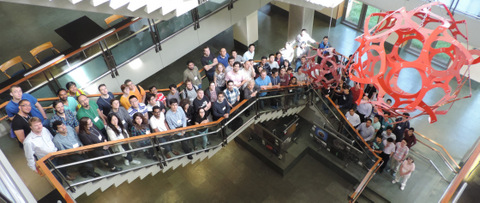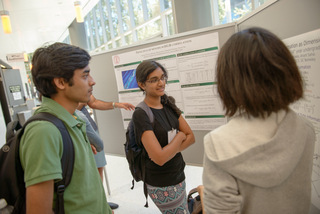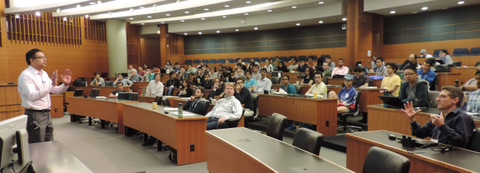
2016 Summer School:
9th North American School of Information Theory
June 21-23, 2016
Duke University
Duke University
Last updated Wed Jul 13, 2022 11:55 AM EDT Changelog
Overview
Held June 21-23, 2016, the NASIT summer school was hosted by Duke University with support and in partnership with Center for Science of Information, as well as IEEE Information Theory Society, and the Information Initiative at Duke. There were 90 students and postdocs attending from 28 universities, with 25 students from our CSoI partners. 19 of the 45 research posters presented were by our CSoI student and postdoctoral members. Read the outcomes report of the school.

Program:
 Five highly regarded researchers, including the 2016 Padovani lecturer, presented tutorials:
Five highly regarded researchers, including the 2016 Padovani lecturer, presented tutorials:
- June 21 AM: Aylin Yener (Pennsylvania State University): Information-Theoretic Security
- June 21 PM: Krishna Narayanan (Texas A&M University): The Peeling Decoder: Theory and Applications
- June 22 AM: Natasha Devroye (University of Illinois, Chicago): The Interference Channel
- June 22 PM: Helmut Bölcskei Padovani Lecturer (ETH Zurich): The Mathematics of Deep Learning
- June 23 AM: René Vidal (Johns Hopkins University): Global Optimality in Deep Learning and Beyond
Additional Resources
School Outcomes
Our students rated the presentation quality on a five point scale from poor (1) to very good (5) overall at a mean of 4.7/5 and had comments such as:
The information theory school (2016) was very useful to get a sense of classical problems in information and coding theory and how they are applied to emerging problems of interest. The broad coverage of the areas in the talks and the posters, together with the chance for exchange of ideas and detailed discussions made this summer school very useful and enlightening. ~ CSoI Graduate Student, Stanford University
Though my background is statistics rather than communication engineering, I learned a lot from the 2016 NASIT, from both lecture talks and from other students. The topics were impressive, such as newly developing tools in information theoretic security, how peeling decoder is implemented in coding theory, how to deal with interference channels, and theories of deep learning. It was great for me to learn from the other students and make friends. ~ CSoI Graduate Student, Purdue University
There were two research poster sessions taking place on both day 1 and day 2. The students found these very beneficial in terms of useful feedback from peers and faculty, gaining the experience of explaining their research to others, and learning about the broader scope of research being undertaken in the field, while increasing their professional connections with their peers. Student ratings using a four-point scale from strongly disagree (1) to strongly agree (4) are below:
| Research Communication Outcomes: | Mean |
| I obtained useful feedback to my projects/research from talking to other students and faculty members | 3.6/4 |
| I gained the experience of explaining my work to other professional peers via the poster session | 3.9/4 |
| I learned about other students’ research efforts through the poster session | 3.8/4 |
| I started some level of professional connections with peers through the poster session | 3.1/4 |


